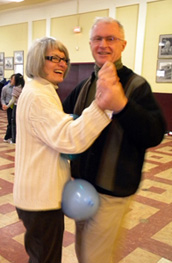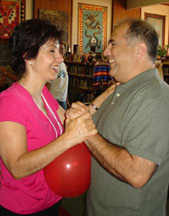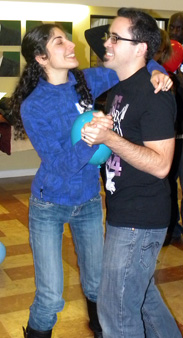Working with the Bahá’í Administration
"The Spiritual Assembly should always be concerned that the believers in its community are being deepened in their understanding of the Bahá’í concept of marriage, especially the young people, so that the very thought of divorce will be abhorrent to them." (On behalf of the Universal House of Justice, Lights of Guidance, no. 1304)
"...[T]he provision of guidance on administrative matters such as the laws of engagement, marriage, and divorce falls under the purview of Local and National Spiritual Assemblies; while Bahá’ís who are professional counselors are free to share with the friends extracts from the Bahá’í Writings and to offer advice of a general nature, it is best that they refer the friends in the first instance to their Local Spiritual Assemblies when questions arise about the application of the laws and Teachings of the Faith." (On behalf of the Universal House of Justice to an individual, September 24, 2014)
Marriage Preparation
“Careful preparation for marriage is an essential first step in the preservation of Bahá’í marriage.” (Bahá’í World Centre Research Department memorandum for Preserving Bahá’í Marriages compilation, item 3)
Friendship
“The Lord…hath made woman and man to abide with each other in the closest companionship, and to be even as a single soul. They are two helpmates, two intimate friends, who should be concerned about the welfare of each other. If they live thus, they will pass through this world with perfect contentment, bliss, and peace of heart, and become the object of divine grace and favor in the Kingdom of heaven.” (‘Abdu’l-Bahá, Selections from the Writings of ‘Abdu’l-Bahá, p. 122)
“…[M]an and woman should truly be friends and should be in sympathy with each other. Their understanding should have a basis in reality and not be based upon passion and desire….” (Provisional translation from a talk by ‘Abdu’l-Bahá)
Courtship
“In the context of the society in which your family now lives, a society in which materialism, self-centeredness and failing marriages are all too common, your sons may well feel that it is wise to have a long period of courtship in which the prospective partners spend much time together and become thoroughly acquainted with each other’s character, background and family. … [I]n a relationship in which such a decision [to marry] has not been taken and in which the law of chastity is strictly observed, there is no objection, in principle, to a prolonged friendship in which the two individuals entertain the possibility of marrying each other at some time in the future.” (A letter from the Universal House of Justice to an individual believer, August 28, 1994, cited in Marriage Can Be Forever—Preparation Counts!, 3rd ed., p. 141)
"It is not surprising that serious-minded Bahá’í youth growing up in a bewildering moral environment are asking for specific guidance on the matter of proper conduct in friendship between boys and girls, men and women. It is also not surprising that their parents and other adult advisors are themselves sometimes confused on the issues that arise as they find old standards are changing and new patterns of behavior are developing in society which are unsettling, possibly even frightening to them. The primary protection for the friends in these matters, both young and old alike, is to continue to deepen, truly deepen, in the Teachings so that their behavior more readily conforms to the high standards of the Faith." (On behalf of the Universal House of Justice to a National Spiritual Assembly, February 5, 1992)
Know One Another’s Character “Bahá’í marriage is the commitment of the two parties one to the other, and their mutual attachment of mind and heart. Each must, however, exercise the utmost care to become thoroughly acquainted with the character of the other, that the binding covenant between them may be a tie that will endure forever.” (‘Abdu’l-Bahá, Selections from the Writings of ‘Abdu’l-Bahá, #86)
"There is a difference between character and faith; it is often very hard to accept this fact and put up with it, but the fact remains that a person may believe in and love [the Bahá’í Faith]—even to being ready to die for it—and yet not have a good personal character, or possess traits at variance with the teachings. We should try to change, to let the Power of God help recreate us and make us true Bahá’ís in deed as well as in belief. But sometimes the process is slow, sometimes it never happens because the individual does not try hard enough." (On behalf of Shoghi Effendi, Unfolding Destiny, p. 440)
“A married couple can be a tremendous strength and support to each other, but building a strong, united marriage requires persistence, effort, and the overcoming of many difficulties together. Thus ‘Abdu’l-Baha advises a young couple to get to know each other’s characters thoroughly before taking this very important step. They must think not only of the effect on each other but of the effects of their characters on the children who will be the fruit of the marriage.” (On behalf of the Universal House of Justice, Investigation of Character, Courtship Practices, and Selection of a Marriage Partner, #1) |
|
Equality
“This principle [of the equality of the sexes] is far more than the enunciation of admirable ideals; it has profound implications in all aspects of human relations and must be an integral element of Bahá’í domestic and community life. The application of this principle gives rise to changes in habits and practices which have prevailed for many centuries.” (From a letter written on behalf of the Universal House of Justice to an individual believer, January 24, 1993)
“Bahá’í men have the opportunity to demonstrate to the world around them a new approach to the relationship between the sexes, where aggression and the use of force are eliminated and replaced by cooperation and consultation. The Universal House of Justice has pointed out in response to questions addressed to it that, in a marriage relationship, neither husband nor wife should ever unjustly dominate the other, and that there are times when the husband and the wife should defer to the wishes of the other, if agreement cannot be reached through consultation; each couple should determine exactly under what circumstances such deference is to take place.” (From a letter written on behalf of the Universal House of Justice to an individual believer, January 24, 1993)
Chastity and Sexual Intimacy
|
“…[T]he Bahá’í conception of sex is based on the belief that chastity should be strictly practiced by both sexes, not only because it is in itself highly commendable ethically, but also due to its being the only way to a happy and successful marital life. Sex relationships of any form, outside marriage, are not permissible therefore…” (On behalf of Shoghi Effendi to an individual, Lights of Guidance, #1157)
|
“The Bahá’í teachings on sexual morality center on marriage and the family as the bedrock of the whole structure of human society and are designed to protect and strengthen that divine institution. Bahá’í law thus restricts permissible sexual intercourse to that between a man and the woman to whom he is married.” (Note #134 appended to The Kitáb-i-Aqdas)
|
"The Bahá’í Faith recognizes the value of the sex impulse…. The proper use of the sex instinct is the natural right of every individual, and it is precisely for this purpose that the institution of marriage has been established." (Shoghi Effendi, Lights of Guidance, #1156) |
Interracial Harmony
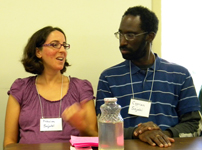
"...Bahá’u’lláh hath said that the various races of humankind lend a composite harmony and beauty of color to the whole. Let all associate, therefore, in this great human garden even as flowers grow and blend together side by side without discord or disagreement between them."
(‘Abdu’l-Bahá, Promulgation of Universal Peace, p. 69)
"...[Y]our statement to the effect that the principle of oneness of mankind prevents any true Bahá’í from regarding race itself as a bar to union [in inter-racial marriage] is in complete accord with the Teachings of the Faith on this point. The Bahá’í Teachings, indeed, by their very nature transcend all limitations imposed by race…."
(Shoghi Effendi to a National Spiritual Assembly, Lights of Guidance, #1288)
Note: Interfaith marriages are also permitted for Bahá’ís.
For resources for intercultural and interracial marriages, see the bottom of the Marriage page or the Resources page.
Couple's Decision to Marry Each Other; Then Consent of Parents Needed
“Although a Bahá’í may, if he chooses, seek his parents’ advice on the choice of a partner, and although Bahá’í parents may give such advice if asked, it is clear from the Teachings that parents do not have the right to interfere in their children’s actual choice of a prospective partner until approached for their consent to marry.” (Universal House of Justice, August 28, 1994, cited in Marriage Can Be Forever--Preparation Counts!, 3rd ed., p. 141)
“...[M]arriage is dependent upon the consent of both parties. Desiring to establish love, unity and harmony amidst Our servants, We have conditioned it, once the couple’s wish is known, upon the permission of their parents, lest enmity and rancor should arise amongst them.” (Bahá’u’lláh, Kitáb-i-Aqdas, K65)
For more information see Relationships and also Resources
Engagement
“…Bahá’u’lláh ordained that Bahá’í engagement should not exceed 95 days, and, although this law has not yet been applied universally, it highlights the desirability of marrying quickly once the decision to marry has been firmly taken and parental consent obtained.” (Universal House of Justice to an individual, August 28, 1994, cited in Marriage Can Be Forever—Preparation Counts!, 3rd ed., p. 141)
Note: For current information on whether this law applies to you, please contact the closest Bahá’í institution.
.jpg)
Bahá’í Wedding Vow
“When the consent of the parents is obtained, the only other requirement for the ceremony is the recitation by both parties in the presence of two witnesses of the specifically revealed verse: ‘We will all, verily, abide by the Will of God.’ The following quotations from letters written …[on behalf of Shoghi Effendi] indicate the desirability of the Bahá’í marriage ceremony being simple:
1. ‘There is no ritual, according to the Aqdas [Kitáb-i-Aqdas], and …[Shoghi Effendi] is very anxious that none should be introduced at present and no general form accepted. He believes the ceremony should be as simple as possible...
2. The only compulsory part of a Bahá’í wedding is the pledge of marriage, the phrase to be spoken separately by the Bride and Bridegroom in turn, in the presence of Assembly witnesses.’” (On behalf of the Universal House of Justice, Lights of Guidance, #1294)
Clarification: The local Spiritual Assembly approves two trustworthy witnesses, often chosen by the couple, but the witnesses do not need to be Assembly members in most cases. Civil laws have varying requirements, so please check with the appropriate Spiritual Assembly for guidance.
Marriage
“Regarding the question of marriage, know thou that the command of marriage is eternal. It will never be changed or altered. This creation is divine, and it is not possible for that which is created by God to be changed or altered.” (‘Abdu’l-Bahá, "To Set the World in Order: Building and Preserving Strong Marriages", compiled by the Research Department of the Universal House of Justice, August 2023, #7)
“…[H]usband and wife should be united both physically and spiritually, that they may ever improve the spiritual life of each other, and may enjoy everlasting unity throughout all the worlds of God.” (‘Abdu’l-Bahá, Selections from the Writings of ‘Abdu’l-Bahá, #86)
"...[T]he House of Justice feels it most essential for your husband and you to understand that marriage can be a source of well-being, conveying a sense of security and spiritual happiness. However, it is not something that just happens. For marriage to become a haven of contentment it requires the cooperation of the marriage partners themselves, and the assistance of their families…." (On behalf of the Universal House of Justice, Compilation of Compilations, Vol. II, #2161)
Marriage and Family As a Service
“...[E]very aspect of a person’s life is an element of his or her service to Bahá’u’lláh: the love and respect one has for one’s parents; the pursuit of one’s education; the nurturing of good health; the acquiring of a trade or profession; one’s behavior towards others and the upholding of a high moral standard; one’s marriage and the bringing up of one’s children; one’s activities in teaching the Faith and the building up the strength of the Bahá’í community, whether this be in such simple matters as attending the Nineteen Day Feast or the observance of Bahá’í Holy Days, or in more demanding tasks required by service in the administration of the Faith; and, not least, to take time each day to read the Writings and say the Obligatory Prayer, which are the source of growing spiritual strength, understanding, and attachment to God.” Universal House of Justice, December 7, 1992, European Bahá’í Youth Council; www.bahairesearch.com)
“…[Y]oung women and men become acutely conscious of the exhortations of the Supreme Pen to ‘enter into wedlock’ that they may ‘bring forth one who will make mention of Me amid My servants’…. …This generation of youth will form families that secure the foundations of flourishing communities. Through their growing love for Bahá’u’lláh and their personal commitment to the standard to which He summons them will their children imbibe the love of God, ‘commingled with their mother’s milk’, and always seek the shelter of His divine law. Clearly, then, the responsibility of a Bahá’í community towards young people does not end when they first start serving. The significant decisions they make about the direction of their adult lives will determine whether service to the Cause of God was only a brief and memorable chapter of their younger years, or a fixed center of their earthly existence, a lens through which all actions come into focus.” (Universal House of Justice, Framework for Action, #39.35)
Consultation for Understanding and Decisions
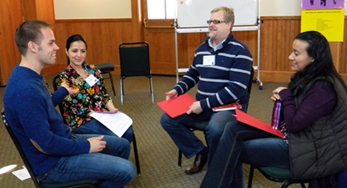
“Consultation…is applicable to the marriage partners and within the family, and indeed in all areas where believers participate in mutual decision-making. It requires all participants to express their opinions with absolute freedom and without apprehension that they will be censured and/or their views belittled....” (Universal House of Justice, January 24, 1993)
[When asked about specific rules of conduct to govern the relationship between husbands and wives] “...[F]or example, the principle that the rights of each and all in the family unit must be upheld, and the advice that loving consultation should be the keynote, that all matters must be settled in harmony and love, and that there are times when the husband and the wife should defer to the wishes of the other. Exactly under what circumstances such deference should take place is a matter for each couple to determine. If, God forbid, they fail to agree, and their disagreement leads to estrangement, they should seek counsel from those they trust and in whose sincerity and sound judgment they have confidence, in order to preserve and strengthen their ties as a united family.” (On behalf of the Universal House of Justice, Compilations of Compilations, Vol. II, “Preserving Bahá’í Marriages”, #2163)
“Family consultation employing full and frank discussion, and animated by awareness of the need for moderation and balance, can be the panacea for domestic conflict. Wives should not attempt to dominate their husbands, nor husbands their wives...” (On behalf of the Universal House of Justice, Compilation of Compilations, Vol. II, #2160)
Humor, Laughter, and Social Connection
“…[L]augh, smile and rejoice in order that others may be made happy by you.” (‘Abdu’l-Bahá, Promulgation of Universal Peace, p. 218)
“It is good to laugh. Laughter is a spiritual relaxation. When [we] were in prison…and under the utmost deprivation and difficulties, each of [us] at the close of the day would relate the most ludicrous event which had happened. Sometimes it was a little difficult to find one but always [we] would laugh until the tears would roll down [our] cheeks. Happiness…is never dependent upon material surroundings, otherwise how sad those years would have been. As it was [we] were always in the utmost state of joy and happiness.” (Attributed to ‘Abdu’l-Bahá when imprisoned with family in the Holy Land, quoted in Howard Colby Ives, Portals to Freedom, p. 120)
“…[Y]ou should not neglect your health, but consider it the means which enables you to serve. It—the body—is like a horse which carries the personality and spirit, and as such should be well cared for so it can do its work! You should certainly safeguard your nerves, and force yourself to take time, and not only for prayer and meditation, but for real rest and relaxation. We don’t have to pray and meditate for hours in order to be spiritual.” (On behalf of Shoghi Effendi, Compilation of Compilations, Vol. II, #1777)
"Humor, happiness, joy are characteristics of a true Bahá’í life. Frivolity palls and eventually leads to boredom and emptiness, but true happiness and joy and humor that are parts of a balanced life that includes serious thought, compassion and humble servitude to God are characteristics that enrich life and add to its radiance.” (Universal House of Justice, January 12, 1997, “The Humorist”, p. 2)
“…[W]hile laughter should not be suppressed or frowned upon, it should not be indulged in at the expense of the feelings of others. What one says or does in a humorous vein should not give rise to prejudice of any kind. You may recall ‘Abdu’l-Bahá’s caution ‘Beware lest ye offend the feelings of anyone, or sadden the heart of any person...’” (On behalf of the Universal House of Justice to an individual, December 1, 1977, “The Humorist”, p. 2)

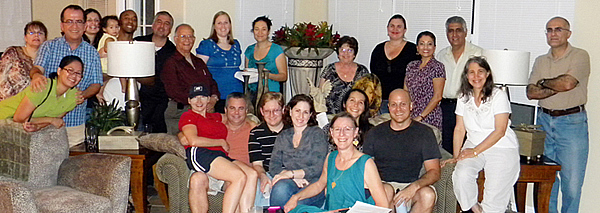
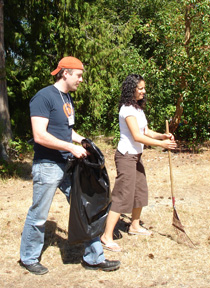


.jpg)

